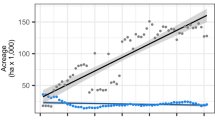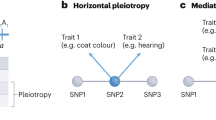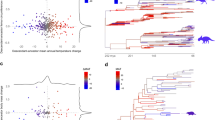Abstract
Differences in the kinetic and/or endurance properties of enzymes encoded by alternative alleles have been suggested as the basic level at which selection could act on allozyme polymorphisms1,2. The correlation between spatial differences in gene frequencies and an environmental variable (hereafter designated cline, in its widest sense), when not spurious, has been proposed to show the working of selection3. Let us suppose that a given cline has originated through an environmentally imposed selection on enzyme activity. Because differences in enzymatic activities among individuals can be split into structural-gene and ‘genetic-background’ components4–6, selection should act on both components in the same direction. That is, a correlation should exist between the environmental variable and the background component and it should be of the same sign as that between the environmental variable and the frequency of the most active allele. It should be less likely for clines conforming to these expectations to be spurious. Here we have investigated the relationship between the alcohol dehydrogenase locus (Adh) polymorphism and temperature in Spanish populations of Drosophila melanogaster and have found that it meets the above criterion.
This is a preview of subscription content, access via your institution
Access options
Subscribe to this journal
Receive 51 print issues and online access
$199.00 per year
only $3.90 per issue
Buy this article
- Purchase on Springer Link
- Instant access to full article PDF
Prices may be subject to local taxes which are calculated during checkout
Similar content being viewed by others
References
Harris, H. Can. J. Genet. Cytol. 13, 381–396 (1971).
Clarke, B. Genetics 79, 101–113 (1975).
Lewontin, R. C. The Genetic Basis of Evolutionary Change (Columbia University Press, New York, 1974).
Ward, R. D. Genet. Res. 26, 81–93 (1975).
McDonald, J. F. & Ayala, F. Genetics 89, 371–388 (1978).
Bulfield, G., Moore, E. A. & Kacser, H. Genetics 89, 551–561 (1978).
Gibson, J. Nature 227, 959–960 (1970).
Vigue, C. L. & Johnson, F. M. Biochem. Genet. 9, 213–227 (1973).
Day, T. H., Hillier, P. C. & Clarke, B. Biochem. Genet. 11, 155–165 (1974).
Clarke, B., Camfield, R. G., Galvin, A. M. & Pitts, C. R. Nature 280, 517–518 (1979).
Voelker, R. A. et al. Genetics 88, 515–527 (1978).
Briscoe, D. A., Robertson, A. & Malpica, J. M. Nature 255, 148–149 (1975).
Sampsell, B. Biochem. Genet. 15, 971–988 (1977).
Powers, D. A. & Place, A. R. Biochem. Genet. 16, 593–607 (1978).
Lindsley, D. L. & Grell, E. H. Genetic Variations of Drosophila melanogaster (Carnegie Inst. Wash. Publ. 627, 1968).
Author information
Authors and Affiliations
Rights and permissions
About this article
Cite this article
Malpica, J., Vassallo, J. A test for the selective origin of environmentally correlated allozyme patterns. Nature 286, 407–408 (1980). https://doi.org/10.1038/286407a0
Received:
Accepted:
Issue Date:
DOI: https://doi.org/10.1038/286407a0
This article is cited by
-
Infestation of a novel host plant by Tephritis conura (Diptera: Tephritidae) in northern Britain: host-range expansion or host shift?
Genetica (2009)
-
Perturbation of gene frequencies in a natural population of Drosophila melanogaster: evidence for selection at the Adh locus
Genetica (1994)
-
Allozyme polymorphism at the αGpdh and Adh loci and fitness in Drosophila melanogaster
Heredity (1989)
-
Analysis of microdifferentiation in a Spanish cellar population of Drosophila melanogaster
Genetica (1987)
-
Mating ability in laboratory-adapted and field-derivedDrosophila melanogaster: The stress of domestication
Behavior Genetics (1987)
Comments
By submitting a comment you agree to abide by our Terms and Community Guidelines. If you find something abusive or that does not comply with our terms or guidelines please flag it as inappropriate.



